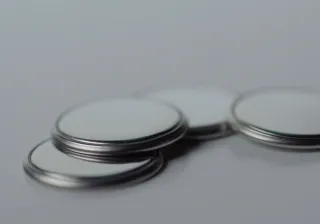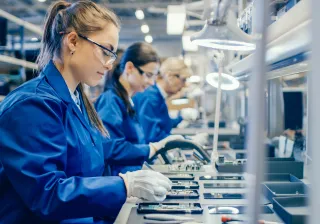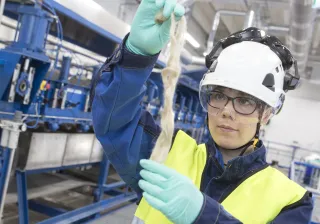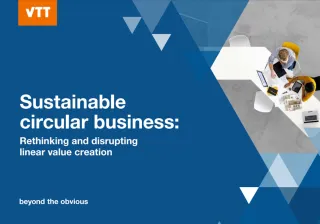Ambitious sustainability goals and rising raw material costs have prompted the mining and battery industries to look for new ways to recycle their side streams. Finnish Minerals Group (FMG) partnered with VTT to find a circular economy solution for treating wastewater that contains sodium sulphate. Using electrodialysis, the team developed a solution with which sodium sulphate can be regenerated into useful chemicals, thus reducing the need to purchase and transport them.
Key results
Electrodialysis provides a technically and economically feasible way to recycle sodium sulphate waste.
Recycling sodium sulphate minimises environmental discharge and reduces costs and CO2 footprint.
In collaboration with Adven, FMG is moving ahead with a plant-scale project with the aim of commercialising the solution.
Finnish Minerals Group (FMG) is a special-purpose company owned by the State of Finland. Its goal is to develop the mining and battery industry in Finland and to maximise the value of Finnish minerals responsibly.
Sodium sulphate in wastewater a growing concern
The production processes of mining, battery and forest industries generate wastewater with high levels of sodium sulphate. While the wastewater is typically not toxic or dangerous, it cannot be released into the environment due to strict limitations for wastewater concentrations.
Throughout the years, several different end-of-pipe solutions have been used to limit the discharge of sodium sulphate into the environment. Today, due to ambitious sustainability goals and rising raw material costs, scientists and companies are working double time to find new, circular ways of processing sodium sulphate.
As the demand for batteries and battery chemicals surges, especially the battery industry is keen to discover a circular economy solution to the wastewater challenge.
FMG partnered with VTT to find a cost-effective way to control the sodium sulphate challenge of industrial wastewater and minimise the generation of sodium sulphate waste. Instead of just getting rid of sodium sulphate, the company wanted to make the most of the side stream.
Electrodialysis an efficient way to recycle sodium sulphate waste
According to VTT Research Scientist Eliisa Järvelä, there is no single fix for the sodium sulphate challenge. Years of careful analyses and extensive testing of numerous methods, however, revealed electrodialysis to be one of the most feasible solutions for highly concentrated solutions.
“With electrodialysis, sodium sulphate wastewater can be split and regenerated into new, product-quality chemicals such as sodium hydroxide and sulphuric acid. Both chemicals are valuable as they are often needed on the site,” Järvelä explains. “Electrodialysis thus allows for the recycling of these necessary ingredients and reduces the need to purchase new chemicals.”
As companies no longer have to transport chemicals to and from their facilities, recycling sodium sulphate waste also reduces the related carbon emissions.
“For a while now, electrodialysis has been seen as a possibility. Now it has matured into a feasible solution thanks to technological advancements, enhanced membranes and increased technical understanding. The on-going battery boom and the need for innovative sustainability efforts also support the use of electrodialysis,” recaps Tuomas van der Meer, Research Team Leader at VTT.
Unique infrastructure and expertise make VTT an ideal research partner
VTT’s unique infrastructure and electrochemical expertise enabled the optimisation and proof of concept development of the electrodialysis process. Through the use of VTT’s comprehensive bench and pilot-scale capabilities, FMG was able to obtain proof-of-concept data and accelerate their overall development process.
The initial conceptualisation and technology screenings were perfected using VTT’s bench-scale electrodialysis system, while the larger-scale, automated electrodialysis infrastructure was used to verify and demonstrate suitability. VTT also helped with the optimisation of the surrounding process steps.

VTT was the natural choice as FMG’s research partner due to the long history of collaboration between the two companies. Since the founding of FMG in 2015, the companies have researched the treatment of sodium sulphate waste extensively together. During the long-term research partnership, different technologies have been piloted and techno-economic comparisons carried out.
“FMG had a good idea of what they needed and how we could support them. They knew VTT has the infrastructure and expertise required to conduct theoretical and experimental studies, build tailored concepts and verify results. We can also support them in the upscaling of the solution,” says Pauliina Tukiainen, Operations Support Manager at VTT.
Plans to commercialise the solutions underway
A circular solution that turns sodium sulphate wastewater from an additional cost to a raw material has the potential to revolutionise the battery industry.
Next, FMG is planning to carry out a plant-scale project and to develop a commercial solution together with Adven Oy. The companies have received 15 million euros in funding from Business Finland for the joint venture.
“The concept we developed together with VTT doesn’t only solve topical environmental challenges, but also provides a promising payback mechanism and potential for large-scale flowsheet optimisation,” says Jani Kiuru, Senior Vice President of Raw Materials at FMG. “Our long-term collaboration with VTT has been one of the key elements paving the way towards industrial applications.”
“The management of effluents containing sodium sulphate is an industry-wide challenge. With these recent developments, it’s now possible to enhance the circularity of sodium sulphate in industries struggling with emissions. VTT can support in the technology evaluation of different streams and help develop the most feasible approach in each case,” says van der Meer.
Our long-term collaboration with VTT has been one of the key elements paving the way towards industrial applications.






